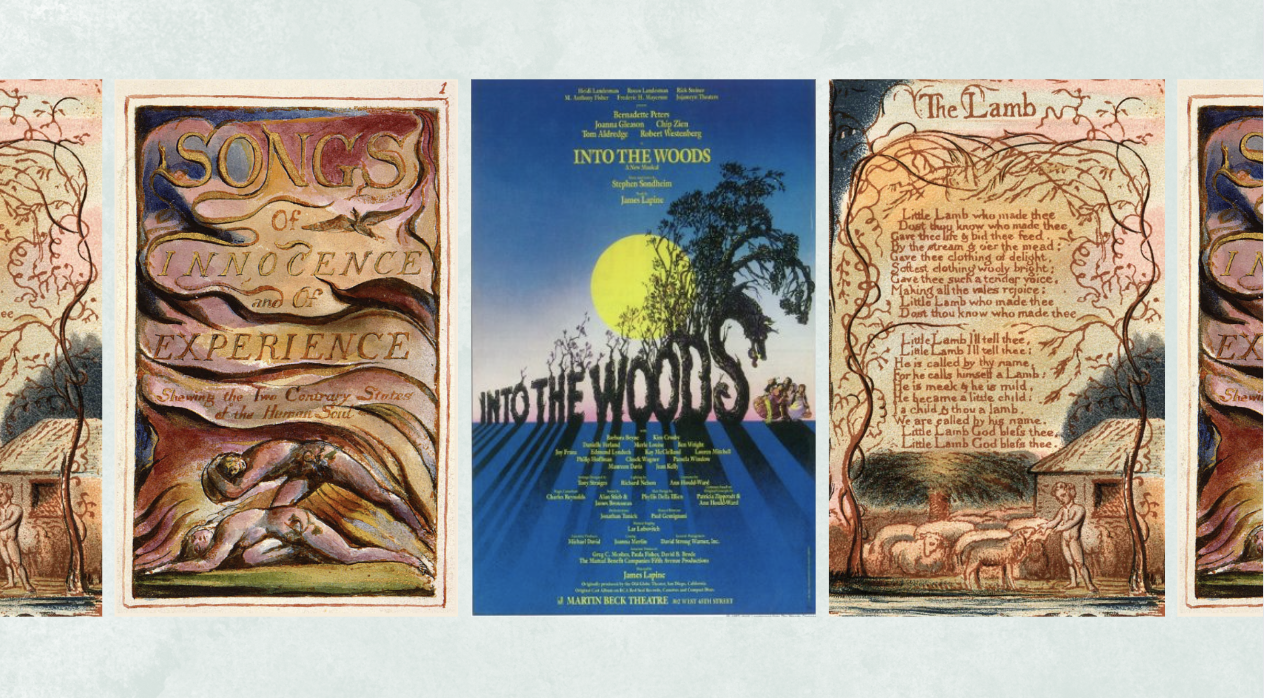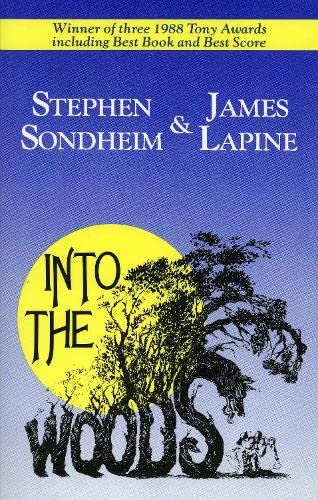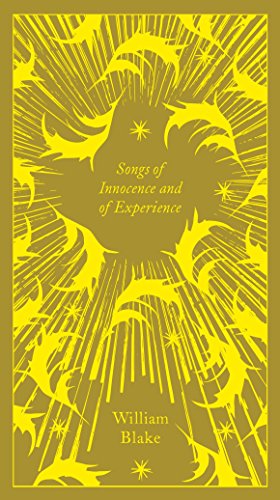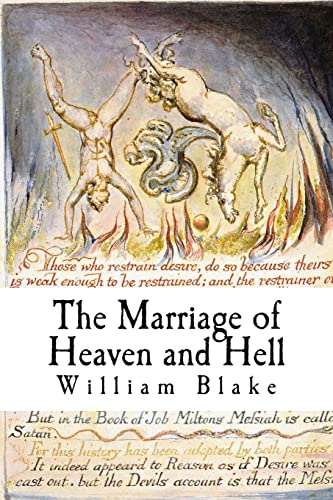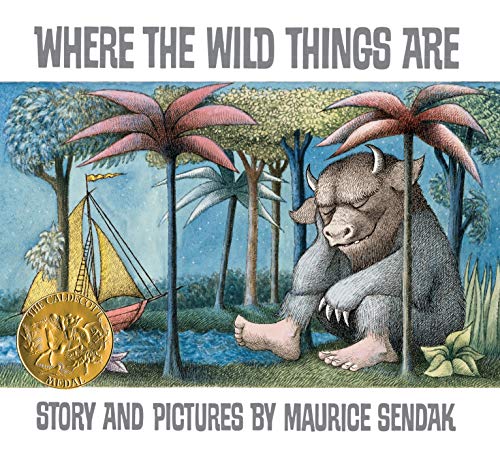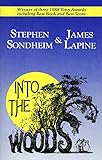 I recently found myself enjoying a delightful production of Stephen Sondheim’s 1988 musical Into the Woods at a local school with an impressive theater program. The middle schooler who played Red was perfectly cast, bouncing up and down insouciantly as she grabbed pastries from the Baker to take to her granny in the woods. As I happen to know the girl and her family, I was all the more chilled by her encounter with the Wolf, whose song of seduction makes it clear to the audience, though not to Red, that his predation is as much sexual as carnivorous. While we don’t see exactly what happens between them, we hear about it in Red’s account later: “He showed me things that I never had seen.” Experience brings wonder. I realized that I was hearing echoes of the British Romantic poet William Blake, who saw desire as part of innocence, not as a corruption of it. Like Sondheim, he uncovered the darker elements of children’s literature, exploring the interplay of innocence and experience, desire and repression. Both writers see the loss of innocence as not an end but a beginning—a fortunate fall.
I recently found myself enjoying a delightful production of Stephen Sondheim’s 1988 musical Into the Woods at a local school with an impressive theater program. The middle schooler who played Red was perfectly cast, bouncing up and down insouciantly as she grabbed pastries from the Baker to take to her granny in the woods. As I happen to know the girl and her family, I was all the more chilled by her encounter with the Wolf, whose song of seduction makes it clear to the audience, though not to Red, that his predation is as much sexual as carnivorous. While we don’t see exactly what happens between them, we hear about it in Red’s account later: “He showed me things that I never had seen.” Experience brings wonder. I realized that I was hearing echoes of the British Romantic poet William Blake, who saw desire as part of innocence, not as a corruption of it. Like Sondheim, he uncovered the darker elements of children’s literature, exploring the interplay of innocence and experience, desire and repression. Both writers see the loss of innocence as not an end but a beginning—a fortunate fall.
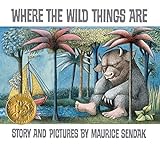 The journey “into the woods” is necessary for Sondheim’s characters to achieve and examine their desires. The woods are not only a setting for the action, suffused with mystery and danger, but also an obvious psychological symbol of the unconscious. They are, as Maurice Sendak would say, “where the wild things are,” and those wild things must be befriended and integrated into the psyche. Late in their quest to collect various items required to break the curse on their family, the Baker’s Wife says to him, approvingly, “You’re different in the woods.” He’s “more sure,” more “daring,” and “much more open-hearted.” The defamiliarization of the woods can make a space for growth and discovery.
The journey “into the woods” is necessary for Sondheim’s characters to achieve and examine their desires. The woods are not only a setting for the action, suffused with mystery and danger, but also an obvious psychological symbol of the unconscious. They are, as Maurice Sendak would say, “where the wild things are,” and those wild things must be befriended and integrated into the psyche. Late in their quest to collect various items required to break the curse on their family, the Baker’s Wife says to him, approvingly, “You’re different in the woods.” He’s “more sure,” more “daring,” and “much more open-hearted.” The defamiliarization of the woods can make a space for growth and discovery.
Besides Red Riding Hood, several other interlaced narratives in Into the Woods also trace the arc from innocence to experience. Cinderella “wishes to go to the festival” to escape the drudgery of life with her stepmother and stepsisters, but in a twist on the fairy tale, she finds that “wanting a ball is not wanting a prince.” She flees from her Prince Charming, and when she tries to describe him—“He’s a very nice prince”—she echoes Red’s earlier observation about the initially charming Wolf: “Nice is different than good.” The word nice, which is Red’s excuse for going with the Wolf, is also Cinderella’s way of categorizing the prince as Not All That. Yet she marries him anyway—which helps set up the disillusionments of Act II.
Meanwhile, Jack, the foolish boy who trades the family’s aged cow for a handful of beans, has the most mystical vision of the three. In “Giants in the Sky,” he sings of his encounter with the giants at the top of the beanstalk, as well as the difficulty of returning home from such a transformative experience:
And you think of all of the things you’ve seen.
And you wish that you could live in-between.
And you’re back again, only different than before.
After the sky.
For each of these characters—Red, Cinderella, and Jack—the loss of innocence happens offstage. Perhaps this is because we’re expected to know their stories already. But Sondheim is also asking us to focus more on the aftermath, questioning the trope of “happily ever after.” In a pattern familiar to us from folklorists such as Joseph Campbell, a hero goes on a quest, and regardless of what material object is found, the real prize is knowledge. Red goes to visit her grandmother and ends up in the belly of the wolf, only to be released into daylight again. The baker and his wife undergo trials analogous to modern-day fertility treatments in their quest to have a child. Jack goes on a mundane errand to sell the cow and ends up meeting a pair of giants and stealing their gold. How can any of them not be profoundly altered by their experiences? As Jack says, “You know things now that you never knew before.”
 Blake’s poetry collection Songs of Innocence and of Experience, published in two parts in 1789 and 1794, challenged the dominant children’s literature of his time, which emphasized moral lessons and cautionary tales. Blake produced Songs of Innocence in the same year as the French Revolution as a blow against the repressive morality of an authoritarian state and church. Five years later, he added the Songs of Experience to illustrate a “contrary state,” not necessarily sinful, but conditioned by social expectations. Like Rousseau, Blake asserted that children’s impulses were naturally good, but that the admonishment to “be good” often means to squelch those impulses in the name of conformity. (As Cinderella asks in the show’s opening number, “What’s the good of being good if everyone is blind?”)
Blake’s poetry collection Songs of Innocence and of Experience, published in two parts in 1789 and 1794, challenged the dominant children’s literature of his time, which emphasized moral lessons and cautionary tales. Blake produced Songs of Innocence in the same year as the French Revolution as a blow against the repressive morality of an authoritarian state and church. Five years later, he added the Songs of Experience to illustrate a “contrary state,” not necessarily sinful, but conditioned by social expectations. Like Rousseau, Blake asserted that children’s impulses were naturally good, but that the admonishment to “be good” often means to squelch those impulses in the name of conformity. (As Cinderella asks in the show’s opening number, “What’s the good of being good if everyone is blind?”)
When Sondheim’s Witch insists that “Children must listen,” she’s channeling the speaker in Blake’s “Nurse’s Song,” in which a nurse observes her young charges at play. The Nurse, jealous of the children’s carefree joy, projects her own disillusionment onto them: “Your sun and your day are wasted in play, / And your winter and night in disguise.” But the Witch also has the motherly impulse to protect her daughter Rapunzel from the “wolves” in the woods. “Stay a child while you can be a child.”
Blake, however, was quick to denounce the polite superficiality that may appear innocent but in fact masks reality. In “A Poison Tree,” the narrator begins,
I was angry with my friend;
I told my wrath, my wrath did end.
I was angry with my foe:
I told it not, my wrath did grow.
The poison plant grows, fed by the speaker’s false smiles and crocodile tears. Although Blake never uses the word nice, he would sympathize with these lines from Sondheim’s Witch:
You’re so nice.
You’re not good,
You’re not bad,
You’re just nice.I’m not good,
I’m not nice,
I’m just right.
I’m the Witch.
You’re the world.
And indeed, Jack’s beanstalk grows from beans originally stolen from the Witch by the Baker’s father. This beanstalk becomes the vehicle for Jack’s life-expanding journey but also for the destruction that invades the play’s world in Act II.
The most famous Song of Experience celebrates the Tyger, that fierce feline whose light burns “in the forests of the night”—a divine energy that is both fearsome and beautiful. In interrogating the Tyger about its origins, the speaker asks about the nature of both God and humanity: questions that might never arise outside the woods. In a pair of poems that Blake shifted from Songs of Innocence to Songs of Experience, “The Little Girl Lost” and “The Little Girl Found,” a girl named Lyca goes missing in the “desert wild.” Her parents find her among lions and tigers, not injured but (we assume) sexually awakened. Rather than respond with fear and outrage, however, they join her there:
To this day they dwell
In a lonely dell,
Nor fear the wolvish howl,
Nor the lions’ growl.
Blake’s Book of Thel, a longer narrative poem from 1789, follows a young girl who tends sheep in the Edenic Vales of Har, yet is full of questions about mortality and about her purpose in life, specifically the natural cycle of reproduction. Ultimately she is permitted to visit the underworld, “to enter and to return,” in the tradition of classical heroes like Odysseus and Aeneas. At “her own grave plot,” she hears a voice articulating still more anguished questions. Thel shrieks and returns to her home. There is much debate among critics as to whether her retreat is a mark of wisdom (refusing to enter the cycle that makes women into biological factories) or immaturity (refusing to take the risk of living in the real world). To me, the most perplexing question is what happens to her after her retreat. Unlike Sondheim’s characters, she doesn’t give her own account of her experience after the fact.
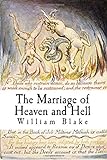 We can also read Into the Woods through the lens of Blake’s 1790 book Marriage of Heaven and Hell, a work of prophetic satire in which Blake inverts traditional categories of morality in order to reclaim the imaginative energy that both church and state have defined as “sin.” During the song “First Midnight,” Sondheim’s characters recite a series of proverbs. Some reflect specific situations in the play, such as Red’s “The prettier the flower, the farther from the path,” or Granny’s “The mouth of a wolf’s not the end of the world.” Others are more cryptic, such as Jack’s mother saying, “Slotted spoons don’t hold much soup.” In Marriage of Heaven and Hell, a section entitled “The Proverbs of Hell” satirizes the conventional proverbs that advocate prudence and responsibility. Perhaps the most pertinent for Sondheim is “Sooner murder an infant in its cradle than nurse unacted desires.” While the proverb appears to recommend infanticide, it’s really drawing a parallel between the unacted desire and the infant. To harbor an unacted desire might be worse than to smother it at birth. As we learn in Act II of Into the Woods, “Wishes are children,” and they will take their own path. Sondheim’s characters find that attaining their wishes may be easier than living into the consequences of them.
We can also read Into the Woods through the lens of Blake’s 1790 book Marriage of Heaven and Hell, a work of prophetic satire in which Blake inverts traditional categories of morality in order to reclaim the imaginative energy that both church and state have defined as “sin.” During the song “First Midnight,” Sondheim’s characters recite a series of proverbs. Some reflect specific situations in the play, such as Red’s “The prettier the flower, the farther from the path,” or Granny’s “The mouth of a wolf’s not the end of the world.” Others are more cryptic, such as Jack’s mother saying, “Slotted spoons don’t hold much soup.” In Marriage of Heaven and Hell, a section entitled “The Proverbs of Hell” satirizes the conventional proverbs that advocate prudence and responsibility. Perhaps the most pertinent for Sondheim is “Sooner murder an infant in its cradle than nurse unacted desires.” While the proverb appears to recommend infanticide, it’s really drawing a parallel between the unacted desire and the infant. To harbor an unacted desire might be worse than to smother it at birth. As we learn in Act II of Into the Woods, “Wishes are children,” and they will take their own path. Sondheim’s characters find that attaining their wishes may be easier than living into the consequences of them.
Finally, both Blake and Sondheim offer lessons in parenting, although Blake’s lessons are less direct. For Blake, the ideal parent or guardian takes their lead from the child, as in the “Nurse’s Song” of Innocence, where the Nurse accedes to the children’s desire to stay out until it is dark:
Well well go & play till the light fades away
And then go home to bed
The little ones leaped & shouted & laugh’d
And all the hills echoed[.]
Sondheim’s Witch turns from lamenting that “children won’t listen” to making the distinction between listening and obedience: “Children may not obey, / But children will listen . . . ./ Careful the tale you tell, / That is the spell.” Both Blake and Sondheim recognize the power of stories, especially in the imaginations of children. Narratives can be far more seductive and persuasive than instructions. Into the Woods follows Blake in encouraging its audience to question the tales we are told and the tales we tell, particularly their beginnings and endings. There is always something that happens before “once upon a time,” and something that follows “happily ever after.” In “The Tyger,” Blake’s speaker asks who can “frame [the] fearful symmetry” of human nature—one answer is the theater. The great genius of Into the Woods is that it allows us to be at once inside and outside that frame, to give ourselves, for a time, to the “forests of the night,” and return home braver and wiser.
